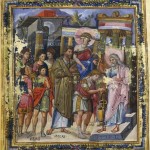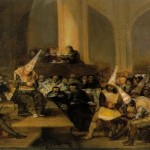(Full disclosure: the author bought me a drink and gave me his book. I found him highly likeable personally, which obviously makes me reluctant to write mean things about his work.)
Andy Crouch is well known in the US Evangelical world as a journalist, writer and speaker. His new(ish?) book is Playing God: Redeeming the Gift of Power. The pitch is fairly straightforward: we as Christians have become afraid of using the word “power” and of thinking of ourselves as exercising power; but, we as women and men are created in the image and likeness of God, and God is (as He is indeed sometimes referred to in the Bible) the Power, and part of our image-bearing vocation is to exercise power. The problem is not power itself, but how we exercise power in the service of idols instead of the true God. We are, indeed, called to “play God”, but in true, image-bearing ways, not false idolatrous ways.
Think of the relation of a parent to a newborn child, Crouch writes. Strictly speaking, a parent has absolute power over the child. The child is utterly dependent on the parent for food and the other necessities of life. And yet we see that this is good, and God-ordained, and that parents are called to use their power over their children, not abdicate it, in ways that help them bear the image of God.
My first reaction as I read the book’s introduction was that this is a very Catholic pitch: the Catholic Tradition lays great emphasis on true exercise of power rather than diffusing power. As I’ve noted recently, the Church likes monarchy. In the Western monastic tradition, the abbot has absolute power over his monks–the structure is not about checks and balances, it is about sanctity. Catholic Tradition is very comfortable with the notion of power–and you could be forbidden for thinking that the history of the Church is a long cautionary tale about the sad consequences of such comfort.
But as I read on, Playing God struck me as an intensely American book. I mean this in a value-neutral way. Explicitly, Playing God is an extended argument against Lord Acton’s famous maxim, “Power corrupts.” No, Crouch says–it’s not power that corrupts, it’s sin that corrupts. Instead, power is a gift from God. So Crouch appeals over and over to us to at least reconsider our deep assumptions about the corruption of power. As someone reading in France where, to pluck an example from recent events, nobody thinks twice about the government using its full power to shut down shows by an anti-Semitic comedian, I found myself thinking that Crouch makes a good point, but an even better point within the context of the American suspicion of power. For power to be rehabilitated, as Crouch rightly wants, I do think it has to be “dehabilitated” first, in a way that Americans readily take for granted but which cannot be so readily taken for granted by others.
Crouch makes much of the idea that the power parents are given shows us that it is not inevitable that “power corrupts.” Parents are given absolute power over their children, and the vast majority of them are not corrupted by it. Maybe. We could quibble about what “corruption” entails, but I see many parents (other parents, not me, of course) who either view their children as idols or use them in the service of other idols. Maybe “the vast majority of parents” in contemporary America do not abuse their children (and, again, we could quibble over the definition of “abuse”), but at the very least it does not strike me as self-evident that this is the historical norm.
Another striking-to-this-Frenchman moment is when, in the context of recounting how he is learning to play the cello as an adult–a very difficult process, and an education in powerlessness–Crouch writes at some length about the awkwardness he felt when his male cello teacher took his hand to show him proper finger placement on the instrument. French-Catholic that I am, I just can’t imagine that I would have found the incident noteworthy, let alone written about it anywhere. Not to prot-troll too much, but I couldn’t help thinking about this:
Another funny-to-me Catholic-Protestant divide moment is when Crouch attributes the famous quip that original sin is the only empirically proven Christian doctrine to Reinhold Niebuhr–I’d always heard it was Chesterton. (The Internet seems to agree with me.)
The book is full of gems.
Crouch points out that the idol’s seductive whisper–from the Garden of Eden on–is that things will be easy. Idolatrous power wants quick results. It wants to, like God, be able to just say “Let it be” and have it be. In the Bible, the acquisition of power is not the end–it is the beginning. Once God creates the world, that is the beginning of the story. We can see a parallel with the Evangelical engagement with politics, the subtext of much of which was “We just need to win the election, and then we can fix everything.” This is, in a sense, the tragedy of the Bush Administration; with the crucial exception of Iraq, the instinct was usually right, the problem was the incompetence of the follow-through. Exercising power is actually serious business.
Another point Crouch makes which perfectly intersects with one of my obsessions is his observation that idolatrous power is zero-sum while image-bearing power is positive-sum. God creates the world for flourishing. God creates the world teeming (Crouch calls attention to the term) with creatures, and then leaves the naming of the creatures and the tending of the garden up to Adam, for better and worse. Idolatrous power is fearful, hands clenched over what it has, afraid to let it go. Image-bearing power gives opportunities for others to exercise power and creates the space for others
For example, Crouch so rightly takes on the popular notion that the depredations of Steve Jobs–his megalomania, his meanness–were somehow necessary elements of his genius. This is a popular notion about great, difficult creators. But, Crouch shows, it is false–Jobs’ idolatry was an impediment to his creative genius. Crouch shows how Jobs’s megalomania prevented him from seeking cancer treatment which could have prevented the spread of the cancer that eventually killed him.
Another thing where Crouch is very good is disentangling power from privilege. Crouch sees privilege as the result of past applications of power and defines it as unconscious power. In the political sphere, conservatives, including Christians among them, are often allergic to the idea of privilege, and the idea that privilege needs to be “checked”, let alone undermined. But the Christian mind ought to be allergic to privilege, or at least hyper-aware of it (some forms of privilege, perhaps, are good–at the very least, only if we are aware of it).
Couch is also very good at his study of institutions. Studying the vital institution of football (I told you this book is American), Crouch writes that institutions are defined as cultural patterns that have artifacts, arenas, rules and roles. Football has the artifacts of, well, the football, and shoulder pads and so on. An institution produces artifacts. And from the Super Bowl stadium to the backyard, football has arenas. Football has rules–both written and unwritten. And football has roles. When those four things come together in a cultural phenomenon, you have an institution. Crouch writes that institutions truly become institutions after the third generation, because by the third generation the institution must exist by its own power rather than the founders’ powers, and the third generation is the first generation that has not known a world without the institution. We as creatures are called to exercise power through institutions–building institutions, and either killing “zombie” institutions that destroy instead of fostering creation, or, by being “trustees”, reviving valuable institutions that need to be preserved but have lost their way.
One excellent insight from Crouch is about the sabbath. Crouch calls on us to observe the sabbath weekly–if you find it impossible to “turn off” one day out of the week, that is a very strong hint that your exercise of power is idolatrous. But he points out that the Levitical command also included the need for a sabbatical year every six years for Israel. Israel was supposed to plan to be able to spend a sabbath year, and Crouch encourages us–insofar as we are able, which he knows not everyone is–to at least give serious thought to the idea of adding a sabbath year or too in our lives. (I can already hear my mother: “You’ve already had a sabbath life, and now you want to add a sabbath year?”)
One particularly touching part of the book is Crouch’s treatment of the institution of slavery, from Paul’s letter to Philemon to Abolition (Catholic note: Crouch skips over the history of the first millennium where, largely under the aegis of the Church, Western Europe became the first slave-free continent in the history of humanity). Over moving pages, Crouch goes on to discuss two modern-day American institutions, abortion and mass incarceration, that are in many ways as destructive as slavery and that, like slavery in 19th century America, we all-too-often tend to see as, if not positive goods, then necessary evils, whereas a better future may be glimpsed. On this–and particularly in his linking of the two–Crouch is absolutely right, and it is a highlight of the book. And as he notes, defeating these institutions will require the exercise of power–judicious, Christian, servant power, but power.
My only complaint about the book is that it sometimes has an in-between quality: not “theological” enough to be a full, “meaty” theological treatise; not practical enough as a “how-to” book. I had to cringe at one point when Crouch asks for his readers’ forgiveness as he begins a rigorous (but very brief) theological treatment of a topic. But it is a very hard needle to thread, and overall the book is a success. More than either a theological treatise or a how-to book, I took it as a series of meditations on power, and as that, it is certainly a very valuable, successful book.













